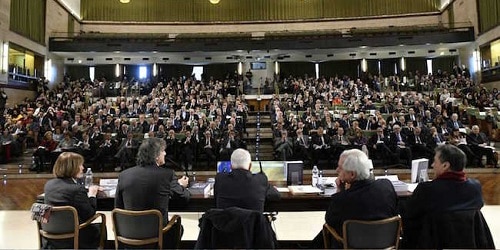
“The process that will lead to the approval of the legislative decree with which the Government intends to start the long-awaited reorganization of the public gaming sector is underway. The Government's intervention has focused in particular on online, on "remote" games only, leaving physical gaming aside for now. However, this double track of intervention risks creating imbalances to the advantage of illegal systems. Added to this is the need to prepare a solution to the numerous problems that afflict the territorial gaming offer without underestimating, at the same time, the impact of the reform on the Italian companies that make up the legal market with the related employment effects. This is what Eurispes writes about the reorganization process of public gaming”. This is what he writes Eurispes in a note.
“Indeed, the data indicates an exponential growth of online this certainly makes it necessary to pay attention to it: in 2022, "physical" collection was 63 billion, while online collection reached 73 billion (+373% compared to 2012): with a forecast of reaching around 83,5 billion of 2023. Lo Draft Decree – the note continues – therefore establishes the new costs of concessions of the online: One-off of 7 million euros for each concession lasting 9 years, while for the previous ones approximately 250.000 euros were paid. The risk of this measure is to translate into a weakening of user protection, through a significant contraction of the perimeter of the legal market, currently occupied by 93 licensed entities, and, in parallel, to revitalize the illegal offer of online operators without concession (the so-called .com). Approximately 80% of the online gaming collection comes from 20 concessionaires, the Government hypothesizes that at least 30 of the medium-sized companies already operating (out of a total of 93) could find participation in the tender profitable, despite having to bear a concession burden that has increased by 28 times (Regulatory Impact Analysis, 4.2. Specific impacts, A. Effects on SMEs).
On the sidelines of the data, the strong risk that the new European race, which is expected to be completed by the end of the year, can further benefit foreign and multinational companies to the detriment of the small and medium-sized businesses that to date have been involved in the online gaming supply chain (from PVRs to service companies, to the same medium-sized concessionaires referred to by the Government). Under the tax profile, the new tender for online collection should produce revenues of around 350 million euros. However, it should be remembered that the State's revenues from the sector come mostly from levies on physical gaming. Relative to 2022, it has ensured 9,2 billion to the state coffers, against 1 billion contributed by the online gaming area: a further migration from physical to online, also induced by the competitive advantage recorded by the online market which can count on a preferential lane on the reorganization road could therefore lead to negative impacts for the Treasury in terms of lower revenues.
The provision, on the other hand, "grazes" the scope of the physical network on a specific aspect: the standardization of PVRs, or the Sales and Top-up Points, authorized by online concessionaires for the opening and top-up of gaming accounts and which represent the territorial projection of the online offer and the main commercial promotion tool within the framework of the current advertising bans ("decree Dignity"). The Government – adds Eurispes – estimates that there are currently 50.000 active PVRs in the area. In this regard, it must be recognized that having "limited" them to those subjects already included in the regulated gaming supply chain, if it goes in the direction of clearing the territory of the presence of entities in which numerous cases of irregularity or illegality have been highlighted, on the other hand , excludes a group of businesses open to the public that have been carrying out this activity for years with an impact on the small businesses that derive income from it and that will find themselves at the mercy of the offer of foreign bookmakers (.com) to be absorbed into illegal networks.
In the first meeting of the Unified Conference for the evaluations on the draft legislative decree held on 25 January, the Regions, the Autonomous Provinces and the Local Autonomies underlined the need for the Government to submit to the Conference the text of the provisions on the reorganization of the physical network before their enactment, on based on the experience of the Agreement signed in 2017, emphasizing the need for their involvement in defining the general lines of the measures to be implemented to combat Gambling Disorder. Of particular interest is the proposal put forward by the Regions for their own sharing, in the amount of 5%, starting from 2027, to the revenue from the tax on gaming machines, aimed at interventions to strengthen the prevention and treatment of gaming addictions and other social fragilities.
Another consideration made by the Regions and which confirms the interconnection between the online and physical areas and therefore the importance of a unified approach, is the one relating to PVRs. The importance for the Regions of being able to access information relating to the locations of these points was underlined since, being qualified as "places of the physical gaming network", knowledge of their location represents necessary information to define the distribution criteria and territorial concentration of physical gaming networks and for measures to combat addictions.
In consideration of what has been said, it is important that the Government follows up on the provisions of paragraph 2 of the art. 1 of the online bill: «The provisions relating to public games admitted in Italy collected via physical network are contained in a subsequent legislative decree issued after the definition of a specific programmatic agreement in this regard between the State, Regions and local authorities».
Regarding the offer of “physical” game, there are many issues to address and resolve: from that of renewal of concessions, to overcome the provisional logic of extensions, to the creation of a definitive and stable picture of tax levies, which has been the subject of continuous increases based on cash flow for years; from the establishment of a correct relationship between the State and the Regions in determining the location of the territorial offer, in sharing concrete, effective and truly applicable actions, in combating Gambling Disorder.
Not addressing these problematic aspects - highlights Eurispes - would mean witnessing a deterioration of the "physical channel" with negative effects on various levels as recently illustrated in the context of the discussion table promoted by Eurispes which shined a light on the specificities of the physical network of public gaming offer and the positive functions it carries out.
First of all, the employment importance of the public gaming offer on the physical network must be highlighted: between 140.000 and 150.000 employees and FTEs (full time equivalents). These numbers attest to the size labor intensive of a supply chain which, moreover, embodies 0,5% of the national GDP (around 10 billion euros, with 9,2 billion euros for the Treasury). Furthermore, if it is true that the Concessions are managed by medium and large companies, the small-medium companies of the managers also operate in the supply chain, representing the link with the operators, and who in turn use services in outsourcing from external parties.
Finally, the operators they operate in approximately 85.000 points of sale, both specialized and generalist. The latter (around 50.000) still represent a widespread network. The current "numbers" of the physical network have already been affected by a reduction between 2017 and 2022. If the reorganization of the offer on the physical network were to operate in the direction of a further limitation of the points of sale, the risk of a negative impact on the employment would become a certainty. Furthermore, a marginalization of the physical network of legal supply would compromise the decisive role of safeguarding legality that it represents.
Another problematic aspect that the reorganization should address is that of the so-called "federalism of the game”. In recent years, Eurispes has repeatedly reported that the policies adopted at a regional level to combat the risks of problematic and/or pathological gambling have produced patchy measures which, however, have been united by the adoption of tools such as the so-called “distance meter” and the compression of timetables. On the one hand, these tools have been found to be inapplicable, and therefore the subject of continuous moratoriums, on the other hand, where even partially applied, they lead to the practical disappearance of a significant part of the legal gaming offer.
From this they descend serious problems for the overall stability of the public gaming offer. First of all, the marginalization of the physical offer has a negative impact on employment levels, which are concentrated precisely on specialized and generalist businesses. Furthermore, it should be considered that the Treasury collects a substantial part of the PREU from the offer of certain products, AWP and VLT: of the approximately 10,5 billion in 2023, more than 5,5 billion derive precisely from gaming through devices. From 2017 to 2023 this figure, among other things, has already fallen by 10%: 5,5 versus 6,1 billion. If this trend were to deepen, the Treasury would be severely damaged, also because a greater withdrawal is made on the machines, while, for the same gaming volumes, online is subject to a decidedly lower withdrawal.
In conclusion, the hope is that all those responsible for and interested in the regulation of the public gaming offer take note of what is contained in the Draft Decree with the aim of improving it and, above all, of arriving as soon as possible at a real and comprehensive reorganization that organically addresses the problems of the physical network.
In this unavoidable process it is essential to listen to the voice of the Local Authorities as soon as possible, but also that of the operators, aware that time is not a "neutral" element. Further delays would in fact see the trends that the market, as it is regulated today, is now clearly demonstrating deepen, and which prefigure a progressive marginalization of the physical network", concludes Eurispes.










